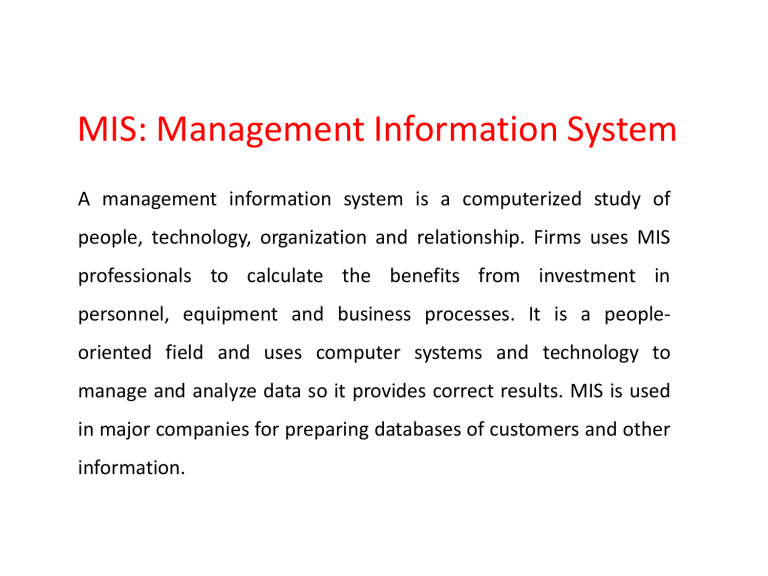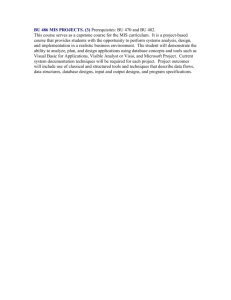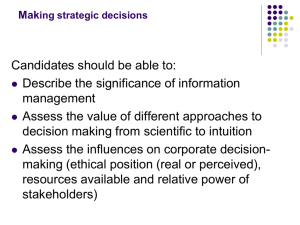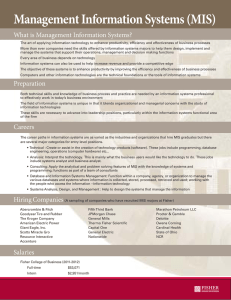MIS & Planning Overview: Management Information Systems Explained
advertisement

MIS: Management Information System A management information system is a computerized study of people, technology, organization and relationship. Firms uses MIS professionals to calculate the benefits from investment in personnel, equipment and business processes. It is a peopleoriented field and uses computer systems and technology to manage and analyze data so it provides correct results. MIS is used in major companies for preparing databases of customers and other information. • MIS professionals are technically proficient and focus on business process and information technology. They try to maximize the benefits from investment. They can choose the following career options: • IT consultants • Business Analysts • System Analyst • Business Intelligence Analyst • Business Application Developer • System Developer • Information System Manager etc. Advantages of MIS • Identify the strengths and weaknesses of companies. • Work as a planning tool. • Provide all over picture of the company. • Collect and analyze information of customers for future references. • Work as a planning and communication tool. MIS - Information Need & Objective • Information processing beyond doubt is the dominant industry of the present century. Following factors states few common factors that reflect on the needs and objectives of the information processing − • Increasing impact of information processing for organizational decision making. • Dependency of services sector including banking, financial organization, health care, entertainment, tourism and travel, education and numerous others on information. • Changing employment scene world over, shifting base from manual agricultural to machine-based manufacturing and other industry related jobs. • Information revolution and the overall development scenario. Growth of IT industry and its strategic importance. • Strong growth of information services fuelled by increasing competition and reduced product life cycle. • Need for sustainable development and quality life. • Improvement in communication and transportation brought in by use of information processing. Nature and Purpose of Planning • Planning is goal-oriented: Every plan must contribute in some positive way towards the accomplishment of group objectives. Planning has no meaning without being related to goals. • Primacy of Planning: Planning is the first of the managerial functions. It precedes all other management functions. • Pervasiveness of Planning: Planning is found at all levels of management. Top management looks after strategic planning. • Middle management is in charge of administrative planning. Lower management has to concentrate on operational planning. Purpose of Planning • To manage by objectives: All the activities of an organization are designed to achieve certain specified objectives. However, planning makes the objectives more concrete by focusing attention on them. • To offset uncertainty and change: Future is always full of uncertainties and changes. Planning foresees the future and makes the necessary provisions for it. • To secure economy in operation: Planning involves, the selection of most profitable course of action that would lead to the best result at the minimum costs. • To help in co-ordination: Co-ordination is, indeed, the essence of management, the planning is the base of it. Without planning it is not possible to co-ordinate the different activities of an organization. Features of Planning • It is primary function of management. • It is an intellectual process. • Focuses on determining the objectives. • Involves choice and decision making. • It is a continuous process. • It is a pervasive function. MIS - Information Need & Objective • Information processing beyond doubt is the dominant industry of the present century. Following factors states few common factors that reflect on the needs and objectives of the information processing − • Increasing impact of information processing for organizational decision making. • Dependency of services sector including banking, financial organization, health care, entertainment, tourism and travel, education and numerous others on information. • Changing employment scene world over, shifting base from manual agricultural to machine-based manufacturing and other industry related jobs. • Information revolution and the overall development scenario. • Growth of IT industry and its strategic importance. Social responsibility and Ethics • Social responsibility is an ethical theory in which individuals are accountable for fulfilling their civic duty, and the actions of an individual must benefit the whole of society. In this way, there must be a balance between economic growth and the welfare of society and the environment. The term social responsibility means different things to different people. Ethical, requires that the business should act in conformity with its values, promises, and obligations to all stakeholders; and. Social Responsibility encourages the business to get involved in the community and other philanthropic initiatives • Planning Premises • The Planning process is based on projections about the future. Though the past influences present plans, plans are designed to attain future objectives. As a result, forecasting future events leads to effective Planning. Because future occurrences cannot be predicted with certainty, assumptions are made about them. • These occurrences could be known facts (tax law changes announced in the budget) or expected events that may or may not occur (entry of competitors in the same market with the same product). • Planning is a very specialised procedure. It is an essential tool in a variety of industries, including management, manufacturing, and business. To fulfil its objectives successfully, each field necessitates a distinct form of plan. • A planning premise is a set of assumptions that are derived from forecasting the future. It is a logical and systematic estimate of the future factors that can affect planning. Planning premises provide a background against which the estimated events take place. • These are the events that affect planning. Establishing planning premises is a critical element in the planning phase, which ensures that all managers in the organization are in sync with each other.




